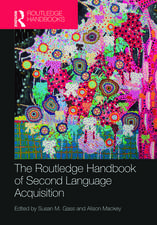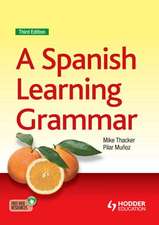Constraints on Language: Aging, Grammar, and Memory
Editat de Susan Kemper, Reinhold Klieglen Limba Engleză Paperback – 7 mar 2013
| Toate formatele și edițiile | Preț | Express |
|---|---|---|
| Paperback (1) | 946.72 lei 6-8 săpt. | |
| Springer Us – 7 mar 2013 | 946.72 lei 6-8 săpt. | |
| Hardback (1) | 952.89 lei 6-8 săpt. | |
| Springer Us – 30 mai 1999 | 952.89 lei 6-8 săpt. |
Preț: 946.72 lei
Preț vechi: 1154.54 lei
-18% Nou
Puncte Express: 1420
Preț estimativ în valută:
181.15€ • 189.65$ • 149.89£
181.15€ • 189.65$ • 149.89£
Carte tipărită la comandă
Livrare economică 05-19 aprilie
Preluare comenzi: 021 569.72.76
Specificații
ISBN-13: 9781475771909
ISBN-10: 1475771908
Pagini: 344
Ilustrații: XVI, 324 p.
Dimensiuni: 155 x 235 x 18 mm
Greutate: 0.48 kg
Ediția:1999
Editura: Springer Us
Colecția Springer
Locul publicării:New York, NY, United States
ISBN-10: 1475771908
Pagini: 344
Ilustrații: XVI, 324 p.
Dimensiuni: 155 x 235 x 18 mm
Greutate: 0.48 kg
Ediția:1999
Editura: Springer Us
Colecția Springer
Locul publicării:New York, NY, United States
Public țintă
ResearchDescriere
Susan Kemper A debate about the role of working memory in language processing has become center-most in psycholinguistics (Caplan & Waters, in press; Just & Carpenter, 1992; Just, Carpenter, & Keller, 1996; Waters & Caplan, 1996). This debate concerns which aspects of language processing are vulnerable to working memory limitations, how working memory is best measured, and whether compensatory processes can offset working memory limitations. Age-comparative studies are particularly relevant to this debate for several reasons: difficulties with language and communication are frequently mentioned by older adults and signal the onset of Alzheimer's dementia and other pathologies associated with age; older adults commonly experience working memory limitations that affect their ability to perform everyday activities; the rapid aging of the United States population has forced psychologists and gerontologists to examine the effects of aging on cognition, drawing many investigators to the study of cognitive aging. Older adults constitute ideal population for studying how working memory limitations affect cognitive performance, particularly language and communication. Age-comparative studies of cognitive processes have advanced our understanding of the temporal dynamics of cognition as well as the working memory demands of many types of tasks (Kliegl, Mayr, & Krampe, 1994; Mayr & Kliegl, 1993). The research findings reviewed in this volume have clear implications - for addressing the practical problems of older adults as consumers of leisure ti- reading, radio and television broadcasts, as targets of medical, legal, and financial documents, and as participants in a web of service agencies and volunteer activities.
Cuprins
List of Contributors. Preface; S. Kemper. Part 1: Constraints on Language: Aging. 1. Language Production and Aging; D.M. Burke. 2. Working Memory and Spoken Language Comprehension: The Case for Age Stability in Conceptual Short-Term Memory; A. Wingfield, P.A. Tun. 3. Discourse Processing and Aging: Resource Allocation as a Limiting Factor; E.A.L. Stine-Morrow, L.M. Soederberg Miller. Part 2: Constraints on Language: Memory. 4. Limitations on Syntactic Processing; S. Kemper, K.A. Kemtes. 5. Verbal Working Memory Capacity and On-Line Sentence Processing Efficiency in the Elderly; G. Waters, D. Caplan. 6. Testing Age Invariance in Language Processes; R. Kliegl, et al. Part 3: Constraints on Language: Grammar. 7. Processing Difficulty and Principles of Grammar; G. Fanselow, et al. 8. Parsing and Memory; L. Frazier. Part 4: Constraints on Language: Neuroscience. 9. Working with Limited Memory: Sentence Comprehension in Alzheimer's Disease; D. Kempler, et al. 10. Memory or Aging? That's the Question: An Electrophysiological Perspective on Language; T.C. Gunter, et al. 11. Age Effects on the Functional Neuroanatomy of Syntactic Processing in Sentence Comprehension; D. Caplan, G. Waters. Concluding Observations; R. Kliegl, S. Kemper. Index.

















